- Home
- John Bellairs
The Hand of the Necromancer
The Hand of the Necromancer Read online
The Hand of the Necromancer
A Johnny Dixon Mystery: Book Ten
Brad Strickland
In memory of Fred Johnson,
a wonderful teacher, a wonderful friend
CHAPTER ONE
"It's gonna be a rotten summer," said Johnny Dixon. "Fergie will be away until August, and my dad can't come home until Christmas. There's nothing at all to do."
Professor Roderick Childermass overcame an urge to snap at his young friend. It was a perfect June day in the 1950s, and the two of them were sitting in kitchen chairs on the professor's porch, a chessboard on a folding table between them. The professor was an elderly man with a nest of white hair, wild muttonchop sideburns sprouting from his cheeks, and a pitted red nose like an overripe strawberry. He glared through his gold-rimmed glasses at Johnny, a short, bespectacled, blond, freckled boy of about thirteen. "Hrrmph," growled the professor. "Nothing at all to do, eh? Well, John, I suppose that you're just here playing chess with me out of pity. It's not that I beat you four times out of six or anything, is it? You just want to humor a crabby old man."
Johnny looked more miserable than ever. "Aw, no, Professor," he said apologetically. "I like playing chess with you. It's just that—well, I was hoping that Dad and I could take our fishing trip in Florida soon, and then he wrote to say we couldn't. Fergie said we were going to work on my batting and fielding this summer, but then his grandmother got sick. Fergie and his mom had to go to Ohio to take care of her, and—and I don't really have any other friends my age, and—oh, I'm sorry."
"Apology accepted." The professor stared at the board, then moved a black knight to threaten one of Johnny's bishops. As Johnny thought about his next move, the professor reflected that his young friend really had some cause for complaint. Johnny was brainy, but he was lousy at sports, and he did not make friends easily. Once a week he went to his Boy Scout meetings, but as often as not the other boys ignored him or played mean tricks on him. Johnny's mother was dead, and his father was off in the Air Force, training Strategic Air Command pilots, so naturally the boy was lonely. He lived with his grandparents across from the professor on Fillmore Street in the town of Duston Heights, Massachusetts. Henry and Kate Dixon were kindly and loved their grandson, but like the professor, they were old. Sometimes young people like Johnny just wanted to hang around with someone else their age. "What exactly is wrong with Byron's grandmother?" asked the professor.
Johnny moved a pawn to protect his bishop, heaved a deep sigh, and sat with his chin resting in his hand. "She fell and fractured her hip. The doctor thinks she's gonna be okay, but it will take a long time for her to get well again. Mrs. Ferguson went out to Ohio to stay with her until she can take care of herself, and Fergie had to go along to help with chores and stuff." Byron Q. Ferguson—"Fergie" for short—was Johnny's only close young friend. They shared a love for historical trivia and a taste for gooey chocolate treats at Peter's Sweet Shop downtown. Fergie, though, was the more adventurous boy. Often Fergie could talk the somewhat timid Johnny into escapades that sometimes landed the two friends in serious trouble. On the other hand, with Fergie around, it was hard to be bored.
Professor Childermass reached to move a rook. For the first time he noticed that if he did, he would open his king to a double-pronged attack from the marauding bishop and from Johnny's queen. "Very clever," he growled, glaring at the chessboard. "Hrrmph. All right, you sneak, you got past my defenses that time. I resign." The professor tipped over his king to show defeat. Then he leaned back and reached for one of his black-and-gold Balkan Sobranie cigarettes and his Nimrod pipe lighter.
"Uh, Professor?" said Johnny, a grin on his face. "Remember, we have a deal. You can smoke only when you win a game."
For a second the professor looked cranky and cross. He had an explosive temper, and he terrified practically everyone in Duston Heights. However, he almost never blew up at Johnny. The old man and the young boy had an odd, unlikely friendship, but it worked. Instead of snarling or snapping, the professor simply replaced his cigarette box with the air of a martyr. "Sooner or later I am going to give up this filthy smoking habit, and then you will have nothing to hold over me," he muttered.
After a moment he added slyly, "John, it seems to me that what you need is a good, honest summer job. Maybe you could work, oh, four hours a day. That would keep you busy, and you could earn money for a Red Ryder air gun or a Super Spy camera or whatever it is boys your age need money for these days."
"Where am I going to find a job?" asked Johnny, his voice discouraged.
"Leave that to me," returned the professor with a grin. "Come along, my fine feathered friend, and I believe I can promise you gainful employment." He rose from his chair and went inside his big, gray stucco house.
Johnny followed the old man upstairs to the cluttered study. The professor's desk overflowed with blue books containing final exams from the spring term at Haggstrum College, where the old man taught history. A stuffed owl wearing a miniature Red Sox baseball cap sat on a round stand by the desk. It stared at the two with glassy yellow eyes. The professor opened the door of a small closet, which he called his fuss closet. It was where he always went when he just had to be alone to rage and rave and stomp around to get some anger out of his system. He had lined the closet with padded gymnasium mats to keep the noise down and had tacked a hand-lettered sign to the back wall: To Fuss Is Human; To Rant, Divine!
On the closet floor was a big cardboard box full of odds and ends that lay jumbled together. The professor lifted the box, took it to his desk, and swept off a drift of papers to make room for his burden. "There," he said, setting the container down with a thump and a rattle. "John, did I ever tell you about Esdrias Blackleach, the weird wizard of Duston Heights?"
Frowning at the box, Johnny shook his head.
"Well, he was one of Duston Heights' earliest settlers. To be perfectly accurate, he settled in a small village called Squampatanong, which is what Duston Heights was called before it was renamed for Hannah Duston. Anyway, you might remember that down in Salem Village in the early 1690s there was a bit of an uproar about witches, warlocks, and wizardry."
"The witch trials," said Johnny. "They hanged a bunch of people who were accused of sorcery."
"To be exact, they hanged nineteen men and women who were condemned as witches. That's not counting a twentieth victim, stubborn old Giles Cory. The court officials pressed him to death by putting him beneath a barn door and piling stones on it until he was crushed. He doesn't really count, though, because his case never came to trial. Well, my boy, at the same time as that little hullabaloo, witchcraft hysteria broke out all over New England, even up here in the hinterlands north of Boston. At that time there were only about one hundred and fifty souls in Squampatanong, and of them a round dozen were accused of witchcraft and imprisoned."
"I haven't heard about that," confessed Johnny. He was itching to find out what lay inside the mysterious cardboard box.
The professor seemed to be in no hurry to satisfy Johnny's curiosity. "I'm not surprised. The episode never got to be as famous as the Salem trials. Fortunately for our town's good name, none of the accused witches were actually hanged. It's a safe bet that none of the citizens of the little village ever dreamed of practicing witchcraft. All but one, anyway: the infamous Esdrias Blackleach. Legends say Blackleach was a genuine, honest-to-badness wizard, or at least he tried to be, though he was never brought to trial. People had just begun to suspect him of witchcraft when he suddenly dropped dead of natural causes. That was a couple of months before Governor William Phips put an end to all the witchcraft trials by decree."
"Professor," said Johnny,
"all this is very interesting, but what does it have to do with my getting a job?"
"Patience is a virtue, John," the professor reminded him. "But let me make it all clear. You remember the summer we spent up at my wacky brother Peregrine's estate in Maine, don't you?"
Johnny shivered. The late Peregrine Childermass had been something of a nut—a rich nut, but loony as a bedbug nonetheless. Peregrine Childermass' estate on Lake Umbagog was a bizarre old place with crumbling towers, sinister statues, and a mysterious tomb. His attempt to use magic to bring comets swooping close to the earth was meant to scare all the nations of the world into peace. Unfortunately, an unscrupulous wizard poisoned Peregrine, swiped his spell, and nearly succeeded in bringing the world to a fiery end. "I remember, all right," said Johnny through clenched teeth.
"I never told you that Peregrine left me this charming assortment of bric-a-brac. These items once belonged to Esdrias Blackleach, and my silly sibling bought them all at auctions over the years."
The professor began to unpack a remarkable heap of junk from the box: three corroded iron balls joined to each other by chains; a snow globe with a house, trees, and a human figure inside; a thin, age-blackened wooden wand; a tarnished hand mirror about three inches across; a small book protected inside a cardboard sleeve; some tiny faded cloth dolls; a wood carving that looked like a life-sized human hand; and other things. "Professor," complained Johnny, "I still don't see how all this is going to get a job for me."
"Elementary, my dear Dixon," returned the professor. "For months the Gudge Museum has been after me to lend this weird conglomeration to them. I haven't done it because, frankly, I don't much like Miss Ferrington, the curator. Then too, I didn't want to go to the trouble of packing all this junk up for the benefit of a bunch of yokels who will gawp at it and tell one another how simpleminded our ancestors were. However, since the museum is so anxious to display this unsavory reminder of our town's past, and since I happen to know that its janitor has just retired to Florida, I think a little quid pro quo is in order."
Johnny grinned. He was good at Latin, and he knew that "quid pro quo" meant a trade, getting something you want in exchange for something you have. "So you'll lend this stuff to the museum if they hire me."
"Exactly. Is it a deal?"
Johnny picked up the so-called snow globe. It was not a true globe or even a dome, but was flattened at the top, like the bottom of a drinking glass. The greenish glass was thick, with bubbles and wavery lines in it. And inside the container was a little human figure, so bundled up that you couldn't tell whether it was a man or a woman. It strode through the snow toward a small log hut. A few faded green cones suggested evergreen trees. Johnny shook the globe, and the fake snow swirled.
The professor picked up the carved hand. "Now, this is a strange piece. In fact, of all this mess, this carving seems to me to be the most uncanny."
Johnny put down the snow globe and stared at the carved hand. "It looks like a form for a left-handed glove."
"Ah." The professor put the hand on the desk. It rested on its cutoff wrist, as if it were waving. The wood was a light brown, with a wavy darker grain in it, something like maple. The fingers were slightly spread, and the thumb stood out at a normal angle. "This is the only item left by the old wizard that ever gave me nightmares. Soon after it came here from Perry's estate, I had some doozies, so I packed it away with the other cute little mementos and forgot about it. Touch it if you want."
Johnny picked it up. The carving felt surprisingly light, not like solid wood at all. He was turning it in his hands when Professor Childermass said, "According to the old stories, that hand is the last work ever carved by old Esdrias Blackleach of Squampatanong—good heavens!"
Johnny cried out and flung the hand away from him. He jerked his arms convulsively, knocking the snow globe to the floor with a loud crash. The hand spun on top of the desk and fell off onto the professor's lap. At that moment Johnny could not even speak, but merely stood there gasping.
For at the mention of Esdrias Blackleach's name, the wooden hand had suddenly closed its fingers on his own, giving him a ghastly handshake.
CHAPTER TWO
The professor's plan to help Johnny get a job came off with only two minor hitches. First, Miss Ferrington agreed to take Johnny on only temporarily, until he proved that he could do the routine work in the museum. Johnny thought that would be no problem. Mr. Haskins, the old janitor, had worked until he was eighty-one. In Johnny's opinion, if he couldn't do at least as much dusting, sweeping, and mopping as an eighty-year-old man, he just wasn't trying.
The second small change in plan was that Professor Childermass let Miss Ferrington have everything except the carved wooden hand. After Johnny's experience, the professor was suspicious about its innocence. Although Johnny and he had tried several times to make it move again by mentioning Esdrias Blackleach's name, it remained just a dead piece of wood. Johnny began to wonder if he had only imagined its movement. Still, the professor decided he had better investigate the relic more fully.
Johnny began work on a Monday morning. His trial period would be one month, and during that time he would earn ten dollars a week for working four hours a day, Monday through Friday. He began to ponder what he could buy with the extra cash.
For a week everything went well. Or as well as could be expected with Miss Ferrington as his boss. She was a sour-faced woman who kept her steel-gray hair in a tight bun, and she peered at the world through thick glasses. She always complained about something, and even when she could find no fault with Johnny's work, she would never compliment him. A frosty "Hmpf, I suppose that will do" was as much as he could expect from her.
The Gudge Museum was a Federal-style building on the north side of West Merrimack Street. It had been built in 1790 as the home of Parson Randolph Gudge of the First Congregational Church, and later became the home of the parson's granddaughter, the poet Sophonsoba Peabody. In fact, Johnny thought, if Miss Ferrington had her way, the museum would be called the Museum of the Great, Wonderful, Underappreciated American Poet Sophonsoba Peabody.
Sophonsoba Peabody had lived from 1812 to 1886, and Miss Ferrington was a descendant of hers. Miss Ferrington did not care about any part of the museum except the Sophonsoba Peabody Room, and she was always trying to buy furniture and clothing and personal articles that had once belonged to old Sophonsoba. Sophonsoba had written long, soupy poems about Nature and Selfless Love. She had known the Massachusetts poet John Greenleaf Whittier, who even in old age used to run three or four blocks out of his way to avoid having to talk to her. The room dedicated to her memory was crammed full of delicate, fragile items that absolutely could not be touched but that had to be kept clean. Johnny could do without the Peabody Room, though he liked most of the other exhibits in the museum.
The professor's boxful of witchy items, minus the wooden hand, wound up on the third floor of the museum, in the Colonial Curiosities Room. This room was the only display area on the stuffy, dusty third floor, where all the other rooms were storage spaces. The Curiosities Room displayed Colonial household items and homemade crafts on shelves and tables, and the Blackleach exhibit had a whole set of shelves to itself. The walls were decorated with antique framed quilts that pioneer women had stitched by hand.
At 1:00 p.m. on Friday, Johnny had just finished dusting the Curiosities Room, which he privately called the Witch Room. This was his last task before he would receive his very first pay envelope. He put up his broom, dustpan, and feather duster, wondering what he would do with all that money.
He paused before the Blackleach shelves and picked up the snow globe. It now had a card in front of it reading:
Handmade Snow Globe
Made by the Early Settler
Esdrias Blackleach, 1690.
(This Is the Earliest American Example of
This Type of Craft).
Since Johnny had knocked the globe off Professor Childermass' desk, it had an additional feature. This was a ha
irline crack where the glass joined the wooden base. It was not more than a half-inch long and almost invisible. The crack did not appear to go all the way through the glass, because no water was leaking out.
Well, at least the globe still worked. Johnny inverted the snow dome, swirled it, and watched the blizzard sweep around the poor traveler inside. The little figure was too small to have a real face, but somehow Johnny imagined it with a look of terror as it desperately tried to reach the safety of the log cabin. Something was after the fleeing figure, something horrible rushing from the woods. It was bounding along on silent paws, and its slavering jaws gaped open to—
"Ah, another fancier of Colonial antiquities." The sly, hoarse voice made Johnny jump a mile and almost made him drop the globe a second time. He thrust it back on its shelf and spun to confront the visitor, who had come silently up behind him. The man was skinny and tall and completely bald, with dark, deep-set eyes. He wore an old black suit, a white shirt that looked faintly yellow with age, and a narrow, black silk tie. He smiled, showing a mouthful of crooked, brown- stained teeth. "My," he said in his hoarse voice, "what an industrious young fellow, tidying up the exhibits, hmm? Do you, by any chance, ah, work here, young man?"
Johnny swallowed hard and nodded.
"Ah, wonderful," the stranger grated. "I understand that somewhere in this establishment are some, um, um, curiosities? Am I correct?"
"Well, we have a lot of exhibits," Johnny said. "There's the Colonial Life Room on the first floor, and the Sophonsoba—"
"Bah!" The stranger almost spat the word out. Then he gave Johnny another twisted smile. "No, I mean artifacts specifically related to, ah, um, the practice of witchcraft."
"S-sure," Johnny stammered. "Th-this is the Wi—I mean, the Curiosities Room. We have some things that used to belong to Esdrias Blackleach."

 The Curse of the Blue Figurine
The Curse of the Blue Figurine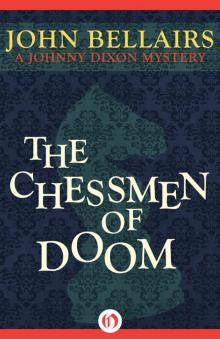 Chessmen of Doom
Chessmen of Doom Secret of the Underground Room
Secret of the Underground Room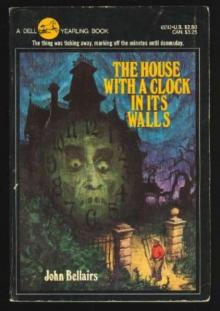 The House With a Clock in Its Walls
The House With a Clock in Its Walls The Vengeance of the Witch-Finder
The Vengeance of the Witch-Finder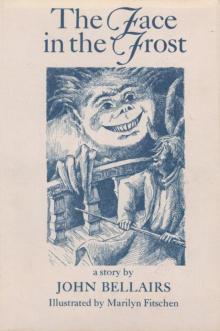 The Face in the Frost
The Face in the Frost Revenge of the Wizard's Ghost
Revenge of the Wizard's Ghost Spell of the Sorcerer's Skull
Spell of the Sorcerer's Skull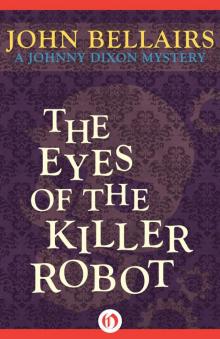 Eyes of the Killer Robot
Eyes of the Killer Robot Mummy, the Will, and the Crypt
Mummy, the Will, and the Crypt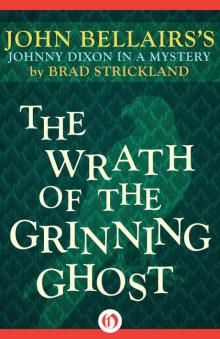 Wrath of the Grinning Ghost
Wrath of the Grinning Ghost The Mansion in the Mist
The Mansion in the Mist The Doom of the Haunted Opera
The Doom of the Haunted Opera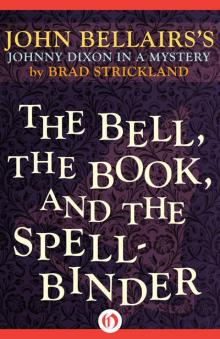 The Bell, the Book, and the Spellbinder
The Bell, the Book, and the Spellbinder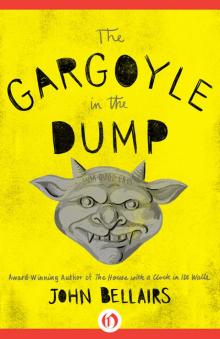 The Gargoyle in the Dump
The Gargoyle in the Dump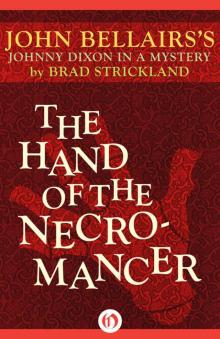 The Hand of the Necromancer
The Hand of the Necromancer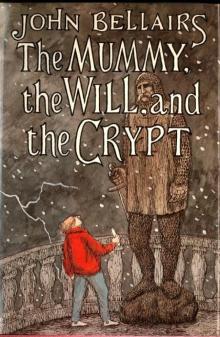 The Mummy, the Will, and the Crypt
The Mummy, the Will, and the Crypt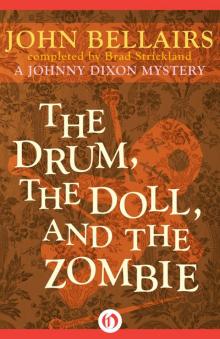 Drum, the Doll, and the Zombie
Drum, the Doll, and the Zombie The Specter from the Magician's Museum
The Specter from the Magician's Museum The Letter, the Witch, and the Ring
The Letter, the Witch, and the Ring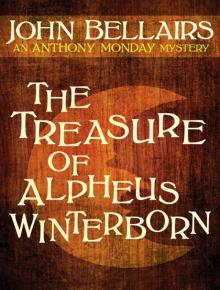 The Treasure of Alpheus Winterborn
The Treasure of Alpheus Winterborn The Dark Secret of Weatherend
The Dark Secret of Weatherend The Figure in the Shadows
The Figure in the Shadows